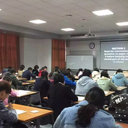Recent advances in characterization of Echinococcus antigen B.
Ключевые слова
абстрактный
Antigen B (AgB) in hydatid cyst fluid of Echinococcus granulosus is a polymeric lipoprotein of 160 kDa and a highly immunogenic major antigen in echinococcal infection. The antigen is comprised of a group of subunit monomers of approximately 8 kDa in molecular size. Recent studies have revealed that the E. granulosus AgB (EgAgB) shows a high degree of genetic variability and the genes encoding the EgAgB 8-kDa subunit monomers that have been identified to date could be grouped into four clades, corresponding to the genes EgAgB8/1, EgAgB8/2, EgAgB8/3 and EgAgB8/4. It has been suggested that the recombinant EgAgB8/2 (rEgAgB8/2) provides better performance in serodiagnosis of human cystic echinococcosis (CE) than does the recombinant EgAgB8/1 (rEgAgB8/1). The EgAgB has been identified as a protease inhibitor with an ability to inhibit recruitment of neutrophils and exploit activation of T helper cells by eliciting a non-protective Th2 cell response, predominantly in patients with progressive CE. Recently it has been revealed that AgB also exists in the cyst fluid of Echinococcus multilocularis. Five different cDNAs encoding the EgAgB homologues have been identified in vesicles, protoscoleces and/or immature adult worms of E. multilocularis and named as EmAgB8/1, EmAgB8/2, EmAgB8/3, EmAgB8/4 and EmAgB8/5. These genes appeared to be expressed in a developmentally regulated manner in the parasite life cycle. This review focuses on recent advances in molecular biological and immunological characterization of AgB from both of E. granulosus and E. multilocularis.


